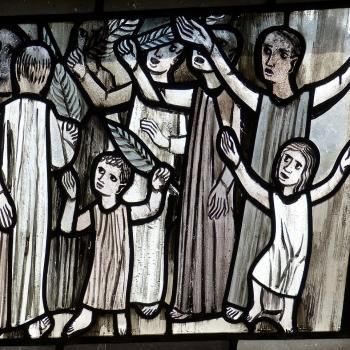One of the books I gave Jeanne for her birthday this past week is As a Woman: What I Learned about Power, Sex, and the Patriarchy after I Transitioned, by Paula Stone Williams. As a father of three, married to a wonderful woman, and holding several prominent jobs within the Christian community, Williams made the life-changing decision to physically transition from male to female at the age of sixty. Almost instantly, her power and influence in the evangelical world disappeared and her family had to grapple with intense feelings of loss and confusion.
Google “Paula Stone Williams,” and you will find numerous Ted Talks, sermons, and interviews in which Williams tells her compelling story. My favorite of those I’ve viewed so far is an hour long 2019 interview at the City Club of Cleveland where Williams shares the interview stage with her son Jonathan Williams, the author of his 2018 memoir She’s My Dad: A Father’s Transition and a Son’s Redemption. Jonathan was the pastor of a growing evangelical Christian church when Paula came out in 2012 and started living as a woman; the interview is a beautifully honest, frank, and loving exploration of the pain and suffering caused by Paula’s transition, as well as of the new relationship they have forged.
Not surprisingly, neither Paula nor Jonathan identify as evangelical Christians any more; they both are pastors of progressive Christian churches—Paula in Boulder, CO and Jonathan in Brooklyn, NY. During the question and answer portion of the interview, an audience member noted that most translations of the Bible are not written in language that affirm LGBTQ people; the questioner asked “How do you navigate the Scriptures?”
Both interviewees laughed and suggested that they and the questioner have a drink afterwards in order for there to be time (they guessed at least two hours) for a full answer to the question. Paula suggested that one way of thinking about the differences between how evangelicals and progressives read and interpret the Bible is to think about various ways of interpreting the U. S. Constitution, beginning with “originalism.”
Originalism requires that a judge ask questions such as “What was the writer’s original intent?” and “What would reasonable people at that time have understood this text to mean?” Advocates of originalism strongly emphasize the difference between judges and legislators and are particularly concerned to root out judicial activism. They contend judges should strive to apply the law as they find it, focusing backward on text, structure, and history, nor forward on their moral convictions or the policy consequences they consider best for today’s society. Justice Antonin Scalia defined it this way: “The Constitution that I interpret and apply is not living but dead, or as I prefer to call it, enduring. It means today not what current society, much less the court, thinks it ought to mean, but what it meant when it was adopted.”
Scalia’s definition positions originalism in opposition to a “living document” approach. In this understanding, a document’s meaning and application is intended to change and grow within identifiable parameters as each generation’s new issues and concerns arise. The “originalism vs. living document” debate often falls into familiar conservative vs. liberal political categories, in which originalists advocate a narrow use of history and reading of the text in order to push back against the perceived liberal tendency to make the text “relevant” and update it to contemporary concerns.
The term “originalism” was coined in the 1980s; constitutional scholars have been interested, among other things, in understanding why this interpretive strategy has become so influential in the U.S., particularly since originalism has little or no influence in other constitutional democracies with similar legislative and judicial histories to the United States, countries such as Canada and Australia. In a recent interview with the New Yorker, Harvard historian Jill Lepore listed a few reasons suggested by scholars for the strong influence of originalism in this country. One particularly caught my attention. Originalism arose in the United States because of the unique historical influence of fundamentalist Protestantism on this country’s history and development—an influence missing both in Canada and Australia.
I was born into the fundamentalist Protestant world that Lepore references–the evangelical Christian world that Paula Stone Williams and Jonathan Williams have emerged from–and I am thoroughly familiar with how literalists read the Bible. I was taught that the Bible is the inerrant and infallible word of God, dictated by divine inspiration to specially selected human beings, then assembled into the Word of God that we call the Bible. The Bible is God’s final word to us, I was taught; all the guidance a Christian needs to live a life pleasing to God can be found between its covers. Many of the vehicles in our church parking lot sported a bumper sticker expressing the appropriate attitude toward Scripture: “God Said It. I Believe It. That Settles It.”

Lepore points out that there is a great deal of similarity between how fundamentalist Protestants treat the Bible and originalists treat the U. S. Constitution. In both cases, the text is a special document that must be treated with the reverence and care that it deserves. Join that conviction with the belief among many conservative Christians in this country that the founding fathers were divinely inspired when they wrote the seminal texts of the United States of America, and originalism becomes a familiar interpretive strategy. Originalism is attractive to many Americans because they are accustomed to treating important texts with deference, even reverence.
The parallels between originalism and fundamentalist Protestantism also provide reasons to be suspicious of both strategies of interpretation. It is worth remembering, as Lepore points out, that the founding fathers themselves were not originalists by any stretch of the imagination. They wanted to break sharply with tradition; the Declaration of Independence includes a litany of injuries caused by the king, deliberately intending to set history aside in exchange for creating something brand new. The last thing on the framers’ minds was to bind future generations of citizens with documents that would not and could not grow and evolve.
A parallel case can be made with regard to Scripture. Christians often forget just how earthshaking and groundbreaking the message of the Gospels truly is. The reported words of Jesus tell us much about how to continually grow and change while following Him; at the same time, Jesus is frequently critical of attempts to rigidly apply what we believe God said in the past to new situations and circumstances. As soon as words of life are treated as fixed and unchanging, doctrine and dogma become substitutes for a faith intended to fruitfully engage with a changing world. Just as Jesus was a living, breathing human being, so the faith that grows from following him should also live and breathe. That means it should never stop being open to change.
In his answer to the question about how he and his congregation treat the Bible, Jonathan Williams suggested what it might be to treat the Bible as a living document.
When you look at the arc of scripture, over and over from the Old Testament to the end of the New Testament you see a God who is more and more progressive, more and more loving, more inclusive in every aspect, so what I ask people is “Is the Bible living?” If it is living, is it possible that God is becoming more progressive, more loving, more affirming just like we see in our scripture? When people say it’s possible, I say that’s what we are affirming in our community.
A God who changes? This is, of course, a scandalous suggestion in many Christian circles, but as I suggested in an essay a couple of weeks ago, we are surrounded by evidence that change is the fundamental feature of the world that God created. What if “created in God’s image” means exactly that–always changing, never static?
One Sunday evening many years ago, I heard a Baptist minister, a family friend and the godfather of my firstborn son, say something shocking from the pulpit. He lifted his well-worn Bible above his head with his right arm and said in a loud voice: “This is not the Word of God!” Gasps filled the sanctuary, followed by an uncomfortable silence. After a dramatic pause of several moments, he continued. “This is just ink on paper between leather covers. This becomes the Word of God when the Holy Spirit makes it so to each of us individually.”
My son’s godfather was right. The divine word changes and grows in each of us, often in apparent conflict with what we thought was already fixed and settled. When temptations arise to find security and safety in inflexible interpretations of important texts, whether the Constitution or Scripture, it is worth taking the words of Paul to the church at Corinth to heart: “The letter kills, but the Spirit gives life.”

















